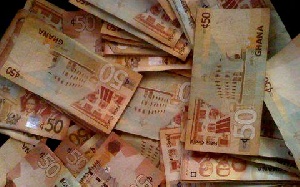The Governor of Bank of Ghana (BOG) Dr. Abdul Nashiru Issahaku has rejected claims that the cedi was likely to see further depreciation heading into the elections and festive season.
According to Dr. Abdul Nashiru Issahaku, the cedi in recent times has shown remarkable strength against the dollar and other trading currencies.
The performance of the cedi he said in 2016 is the best compared to previous elections especially 2008 and 2012.
The central banks governor’s comment comes at a time that the local currency which showed signs of remaining on course to finish the year on the high, is showing signs of stuttering.
The cedi which has been largely stable especially against its major trading partner, the US dollar, depreciating just by 4.3 percent as at October 2016, according to the latest data from the same central bank reveals that the cedi, as at November 18, has depreciated against the USD by 4.6 percent, the highest in 2016.
But the governor of the central bank told journalist in Accra during a press conference to conclude the 73rd monetary policy committee meeting in Accra that, the cedi during an electioneering year like this was rather more stable compared to its performance in previous years.
“The claim that the cedi is stabilizing is evident, it’s actually stabilizing. When we compare to last year and previous elections it’s for a reason. There is improved performance of the currency given what we expected what we are seeing now in an election year. When I say ‘we’ I mean general citizenship of this country. And what we are seeing is a remarkable performance of the currency compared to last year when it was about 15 percent depreciation,”
“We are proactively responding to the[volatility] both from the way we intervene in the market to moderate the volatility, not hold it because we operate a liberal price system here,” he stated.
However, the head of the central bank Dr. Abdul Nashiru Issahaku said, the marginal movements in the exchange rate market with regards to the cedi was expected, and the central bank was adequately observing the developments.
“One of the things we do is moderate volatility of the currency. Stability means there will be some movements up and down. What we are seeing is some of the movement which is expected and we’ve indeed expected that to happen.”
Meanwhile the thebftonline.com checks on the market reveals that, the stress on the local currency could be down to seasonal demands ahead of Christmas festivities and/or the work of speculators who want to cash in on the uncertainties surrounding the December 7 polls.
West Africa’s worst performing currency, the Ghana Cedi has been projected to depreciate by about 5 percent this year.This means it will trade at 4 cedis 50 pesewas to a dollar by the end of December.
However, the performance of cedi against the British pound has been has been remarkable with the local currency gaining on the pound by 13.7 percent as at November 17.
The cedi holds a similar success story against the Euro, depreciating by just 2.4 percent within the period in review.
Business News of Wednesday, 23 November 2016
Source: B&FT
Cedi depreciation not possible this December - Governor
 Dr. Issahaku has rejected claims that the cedi could see further depreciation heading into the polls
Dr. Issahaku has rejected claims that the cedi could see further depreciation heading into the polls












